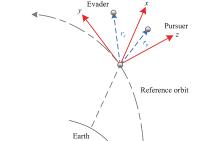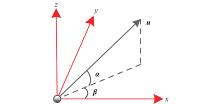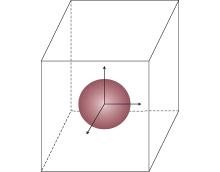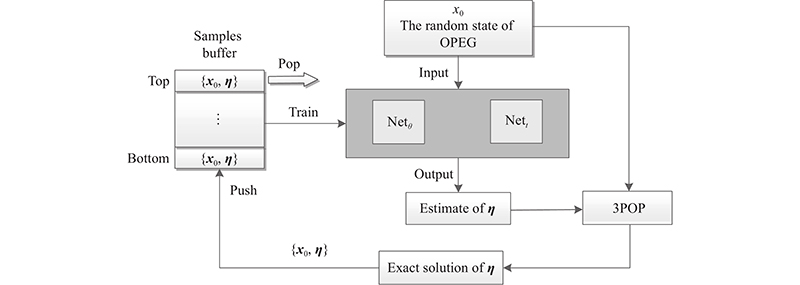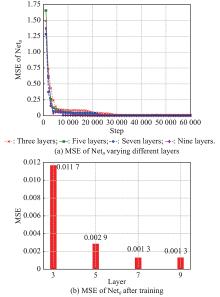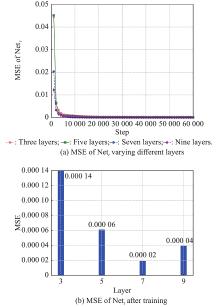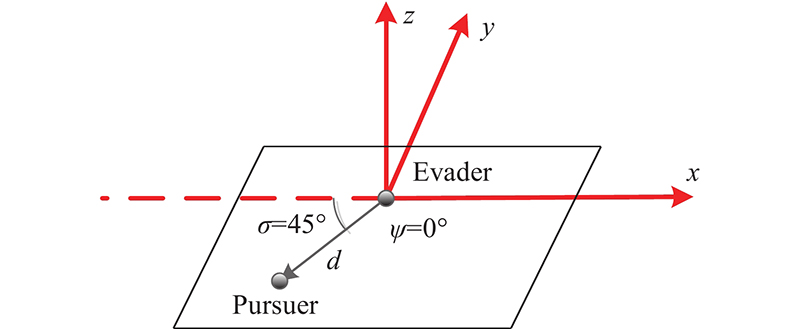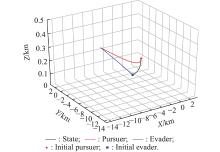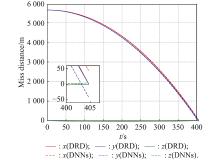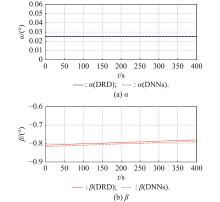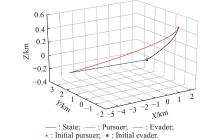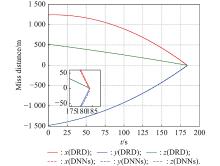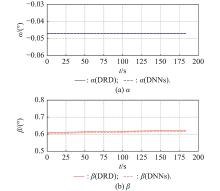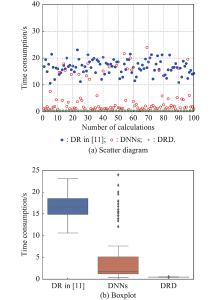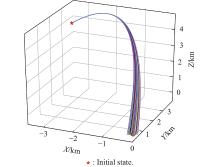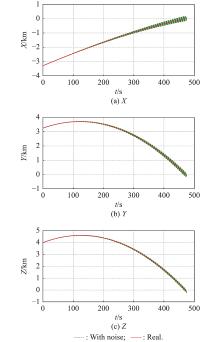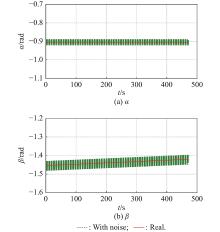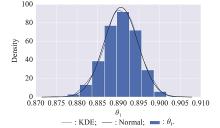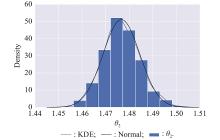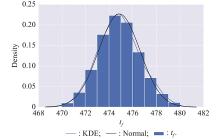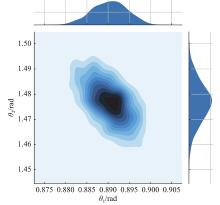Journal of Systems Engineering and Electronics ›› 2022, Vol. 33 ›› Issue (6): 1294-1308.doi: 10.23919/JSEE.2022.000149
• • 上一篇
-
收稿日期:2021-04-25出版日期:2022-12-18发布日期:2022-12-24
An optimal guidance method for free-time orbital pursuit-evasion game
Chengming ZHANG( ), Yanwei ZHU(
), Yanwei ZHU( ), Leping YANG(
), Leping YANG( ), Xin ZENG(
), Xin ZENG( )
)
- 1 College of Aerospace Science and Engineering, National University of Defense Technology, Changsha 410000, China
-
Received:2021-04-25Online:2022-12-18Published:2022-12-24 -
Contact:Yanwei ZHU E-mail:zhchm_vincent@163.com;zywnudt@163.com;ylpnudt@163.com;xzavier0214@outlook.com -
About author:
ZHANG Chengming was born in 1998. He received his B.S. and M.S. degrees from National University of Defense Technology (NUDT), Changsha, China, in 2019 and 2021, respectively. He is a graduate student with the College of Aerospace Science and Engineering, NUDT. His research interests include aerospace dynamics, guidance and control, and application of artificial intelligence to the control of astronautic systems. E-mail: zhchm_vincent@163.com
ZHU Yanwei was born in 1981. He received his B.S., M.S. and Ph.D. degrees from National University of Defense Technology (NUDT), Changsha, China, in 2002, 2004 and 2009, respectively. He is an associate professor with the College of Aerospace Science and Engineering, NUDT. His research interests include aerospace dynamics, guidance and control, and astronautic mission planning and design. E-mail: zywnudt@163.com
YANG Leping was born in 1964. He received his B.S. and M.S. degrees from National University of Defense Technology (NUDT), Changsha, China, in 1984 and 1987, respectively. He is a professor with the College of Aerospace Science and Engineering, NUDT. His research interests include aerospace dynamics, guidance and control, and astronautic mission planning and design. E-mail: ylpnudt@163.com
ZENG Xin was born in 1992. He received his B.S. and M.S. degrees from National University of Defense Technology (NUDT), Changsha, China, in 2014 and 2016, respectively. He is a student with the College of Aerospace Science and Engineering, NUDT. His research interests include aerospace dynamics, guidance and control, and application of artificial intelligence to the control of astronautic systems. E-mail: xzavier0214@outlook.com -
Supported by:This work was supported by the National Defense Science and Technology Innovation (18-163-15-LZ-001-004-13).
引用本文
. [J]. Journal of Systems Engineering and Electronics, 2022, 33(6): 1294-1308.
Chengming ZHANG, Yanwei ZHU, Leping YANG, Xin ZENG. An optimal guidance method for free-time orbital pursuit-evasion game[J]. Journal of Systems Engineering and Electronics, 2022, 33(6): 1294-1308.
| 1 | LUO Y Z, LI Z Y, ZHU H. Survey on spacecraft orbital pursuit-evasion differential games. Scientia Sinica Technologica, 2020, 50(12): 1533−1545. |
| 2 | ISAACS R. Differential games. New York: John Wiley & Sons, 1965. |
| 3 | RAIVIO T, EHTAMO H. Visual aircraft identification as a pursuit-evasion game. Journal of Guidance, Control, and Dynamics, 2000, 23(4): 701−708. |
| 4 |
SHIMA T Optimal cooperative pursuit and evasion strategies against a homing missile. Journal of Guidance, Control, and Dynamics, 2011, 34 (2): 414- 425.
doi: 10.2514/1.51765 |
| 5 |
PONTANI M, CONWAY B A Numerical solution of the threedimensional orbital pursuit-evasion game. Journal of Guidance, Control, and Dynamics, 2009, 32 (2): 474- 487.
doi: 10.2514/1.37962 |
| 6 | SUN S T. Two spacecraft pursuit-evasion strategies on low earth orbit and numerical solution. Harbin: Harbin Institute of Technology, 2015. (in Chinese) |
| 7 | YE D, SHI M M, SUN Z W. Satellite proximate pursuitevasion game with different thrust configurations. Aerospace Science and Technology, 2020, 99: 105715. |
| 8 | JAGAT A, SINCLAIR A J. Optimization of spacecraft pursuit-evasion game trajectories in the Euler-Hill reference frame. Proc. of the AIAA Guidance, Navigation, and Control Conference, 2014. DOI: 10.2514/6.2014-4131. |
| 9 | HAFER W T, REED H L, TURNER J D, et al. Sensitivity methods applied to orbital pursuit evasion. Journal of Guidance, Control, and Dynamics, 2015, 38(6): 1118−1126. |
| 10 | STUPIK J, PONTANI M, CONWAY B A. Optimal pursuit/evasion spacecraft trajectories in the hill reference frame. Proc. of the AIAA Guidance, Navigation, and Control Conference, 2012. DOI: 10.2514/6.2012-4882. |
| 11 | LI Z Y, ZHU H, LUO Y Z. A dimensionreduction solution of freetime differential games for spacecraft pursuitevasion. Acta Astronautica, 2019, 163: 201−210. |
| 12 |
YIN S S, LI J, CHENG L Low-thrust spacecraft trajectory optimization via a DNN-based method. Advances in Space Research, 2020, 66 (7): 1635- 1646.
doi: 10.1016/j.asr.2020.05.046 |
| 13 | CHENG L, WANG Z B, JIANG F H, et al. Fast generation of optimal asteroid landing trajectories using deep neural networks. IEEE Trans. on Aerospace and Electronic Systems, 2020, 56(4): 2642−2655. |
| 14 | WU Q C, LI B, LI J, et al Solution of infinite time domain spacecraft pursuit strategy based on deep neural network. Aerospace Control, 2019, 37 (6): 13- 18. |
| 15 |
LI Z Y, ZHU H, LUO Y Z Saddle point of orbital pursuit-evasion game under j2-perturbed dynamics. Journal of Guidance, Control, and Dynamics, 2020, 43 (9): 1733- 1739.
doi: 10.2514/1.G004459 |
| 16 | BASER T, OLSDER G J. Dynamic noncooperative game theory. Philadelphia: Society for Industrial and Applied Mathematics, 1999. |
| 17 |
JIANG F H, BAOYIN H X, LI J F Practical techniques for lowthrust trajectory optimization with homotopic approach. Journal of Guidance, Control, and Dynamics, 2012, 35 (1): 245- 258.
doi: 10.2514/1.52476 |
| 18 | HOWARD D C. Orbital mechanics for engineering students. 2nd ed. Amsterdam: Elsevier, 2010. |
| 19 | CHENG L, WANG Z B, JIANG F H, et al. Real-time optimal control for spacecraft orbit transfer via multi-scale deep neural networks. IEEE Trans. on Aerospace and Electronic Systems, 2019, 55(5): 2436−2450. |
| 20 | CHENG L, JIANG F H, LI J F. A review on the applications of deep learning in aircraft dynamics and control. Mechanics in Engineering, 2020, 42(3): 267−276. |
| 21 | RUNARSSON T P, YAO X Search biases in constrained evolutionary optimization. IEEE Trans. on Systems, Man, and Cybernetics, Part C: Applications and Reviews, 2005, 35 (2): 233- 243. |
| 22 | VENIGALLA, SCHEERES D J. Spacecraft rendezvous and pursuit/evasion analysis using reachable sets. Proc. of the Space Flight Mechanics Meeting, 2018. DOI: 10.2514/6.2018-0219. |
| No related articles found! |
| 阅读次数 | ||||||
|
全文 |
|
|||||
|
摘要 |
|
|||||
